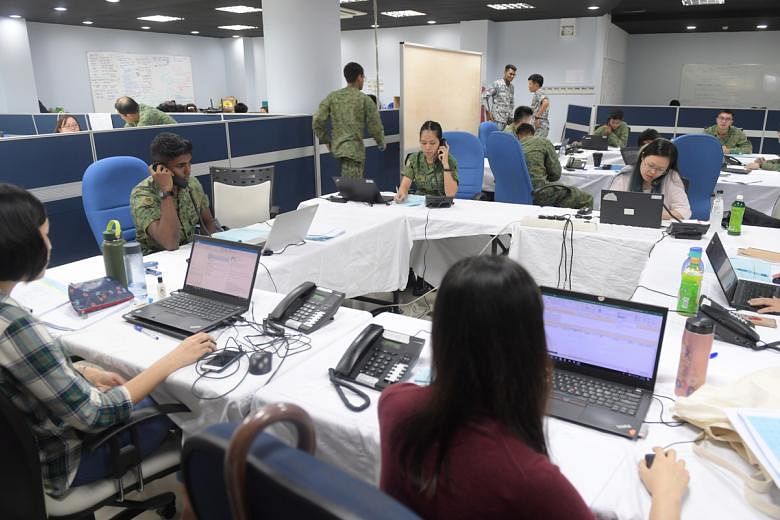SINGAPORE - When Third Sergeant Reuben George Pharez was activated to call people on stay-home notices - who are not allowed to leave home even to buy food - in the second week of March, his team of six was making about 50 to 100 calls a day.
But with the number of confirmed coronavirus cases in Singapore surging since then, the workload has increased by hundreds of daily calls. His shift has also been extended to 12 hours, from about five hours a day.
Despite the occasional unpleasant encounter, 3SG Pharez, an armoured engineer by vocation, feels encouraged that most of the people they call are thankful for his team's efforts.
"They appreciate the fact that we're calling to check in on them... It's good to know that they willingly cooperate.
"They mention things like 'don't worry, I'll be at home, I won't go anywhere', and they are also doing their part to fight this (virus)," the full-time national serviceman, 22, told reporters at Mandai Hill Camp on Friday (April 3).
He is tasked with calling those who have been told to stay home but have failed to respond to compliance checks by the Immigration and Checkpoints Authority (ICA).
His team compiles the reasons given and submits them to ICA for follow-up action. About a fifth of all calls they make are not answered or returned, said 3SG Pharez.
He is among more than 1,300 people from the Singapore Armed Forces and the Ministry of Defence, including defence executive officers, regulars, and SAF Volunteer Corps volunteers (SVs), who are involved in contact tracing and calling those unresponsive to compliance checks.
The operations at Mandai Hill Camp, coordinated by SAF's 6th Singapore Division headquarters, run seven days a week, from 8am to 11pm daily. The SAF started helping with contact tracing from March 20 and calling stay-home notice holders from Feb 21.
Brigadier-General Lee Yi-Jin, commander of the 6th Division and the SAF task force for health monitoring and contact tracing operations, told reporters on Friday (April 3) that the SAF is always ready to do whatever it takes to defend Singapore's families and way of life.
"I think it's quite clear that both of those... are vulnerable for as long as the virus remains uncontained. So that's why when MOH (Health Ministry) asked us for our support, we were very clear that this is something that we have to do."
He added that they were prepared for even more cases to come, based on recent trends. "I think being prepared means that every time a new case comes up, we trace its contacts as soon as possible in order to contain the spread of this virus."
The SAF has previously helped man temperature screening stations at the airport, as well as monitoring the health of travellers from Hubei province in China, where the coronavirus originated.
SAF Volunteer Corps volunteer Lim Li Ly, 23, who signed up to help as a phone operator, said that by performing this task, she hopes to serve and protect the community.
The accountancy undergraduate from the National University of Singapore has served two shifts a week - from noon to 5pm - for the past two weeks.
She said: "Despite having to set aside time from my school and other activities, I still try to make an effort to be part of this operation, because I feel it's really a situation where every Singaporean should be responsible."
Ms Tiffany Chua, 25, a protocol officer with the Ministry of Defence, volunteered to be part of the contact tracing team, which assesses which of the close contacts of a suspected or confirmed case needs to be quarantined.
Based on information provided by the hospital, the team traces contacts from two days before the confirmed or suspected case has onset of symptoms till when he or she has been hospitalised.
"Some challenges include people not trusting that we're calling on the Ministry of Health's behalf, so we'll let them know the verification checks they can do, including calling the MOH hotline and verifying the phone numbers and names we're calling them with," she said.
Correction note: This story has been updated for accuracy.












